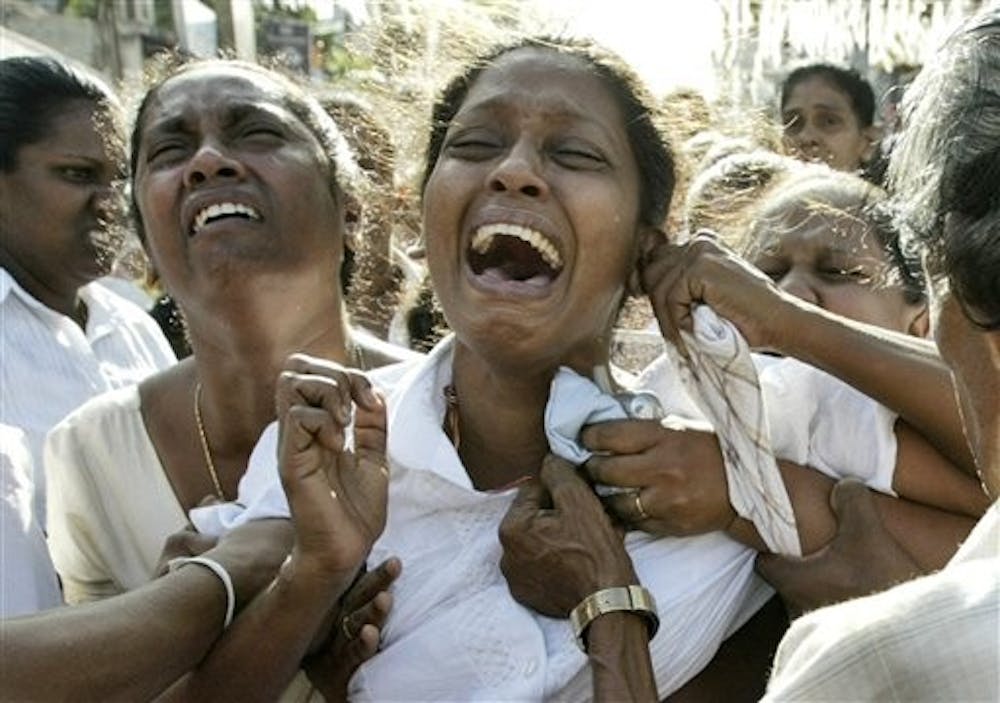COLOMBO, Sri Lanka – Sri Lanka’s cease-fire deal ended Wednesday in a spasm of violence, as suspected Tamil Tiger rebels bombed a civilian bus, gunned down the fleeing passengers and attacked farmers as they retreated into the bush, killing 31 people.\nThe attack stoked fears that the official end of the six-year-old truce – largely ignored in recent years – would lead to even worse violence.\nPresident Mahinda Rajapaksa said although Wednesday’s violence was timed to coincide with the government’s official withdrawal from the cease-fire, it simply mirrored other attacks by the separatist group in recent months.\n“This is a brazen demonstration to the whole world of its unchanged commitment to terrorism and the absolute rejection of democracy and all norms of civilized behavior in the pursuit of its unacceptable goal of separation,” he said in a statement.\nThe U.S. Embassy condemned the bus attack, saying “it bears all the hallmarks” of the rebels.\nSpokesmen for the rebels could not immediately be reached for comment. But the group, listed as a terror organization by the U.S. and European Union, routinely denies responsibility for such attacks.\nThe Tamil Tigers have been fighting since 1983 for an independent state for Sri Lanka’s ethnic Tamil minority in the north and east after decades of being marginalized by Sinhalese-dominated governments. The fighting has killed more than 70,000 people.\nSenior government officials have vowed to destroy the rebel group by the end of the year, and fighting has raged for months across the front lines along the frontiers of its de facto state in the north.\nThe attackers struck at about 7:30 a.m. when they detonated a 45-pound roadside bomb alongside a passenger bus as it traveled through the remote town of Buttala, about 150 miles southeast of Colombo.\nGunmen then shot the panicked passengers as they tried to flee, witnesses said.\n“Everyone that got out through the doors, they shot and killed,” said a 25-year-old passenger who gave his name as Sampath. “I jumped from the window and just escaped.”\nThe windows of the red bus were shattered by the bomb and bullet holes riddled the sides.\nThe attack killed 26 people – most from gunshots – and wounded 62 others, military spokesman Brig. Udaya Nanayakkara said. The assailants retreated into the bush, shooting and killing five farmers they met along the way and wounding two others, he said.\nSoon after the attack, a second roadside bomb struck an armored military vehicle in the same region, wounding three soldiers, Nanayakkara said.\nThe bombings came on the final day of the cease-fire, which had largely broken down over the past two years amid renewed fighting that killed 5,000 people.\nThough scrapping the truce has little direct impact on the raging war, the Cabinet’s unanimous decision two weeks ago to annul the deal was criticized by peace mediators and foreign governments, who worried it would make it even more difficult to end the decades-old conflict.\nSince that decision, nearly 400 people have been killed in attacks, according to \nthe military.\nAmnesty International called for both sides to return to the truce, saying the end of the agreement will increase indiscriminate attacks against the civilian population.\nThe most immediate effect of the end of the cease-fire was the dissolution of the Sri Lanka Monitoring Mission, one of the few independent groups with access to both sides.\nAt a final news conference, the head of the mission, Lars Johan Solvberg, said the number of cease-fire violations had grown so large by last year the mission was no longer able to track them, and he worried the situation could worsen once his team leaves.
31 killed in bus attack as Sri Lankan cease-fire ends
Violence caps six years of peace

Get stories like this in your inbox
Subscribe


